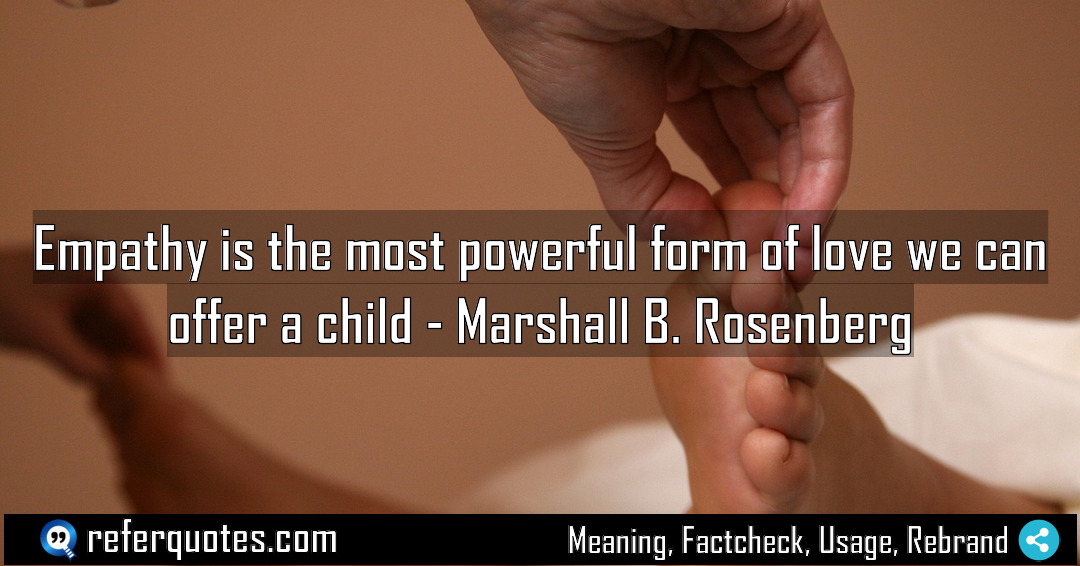
Empathy is the most powerful form of love we can offer because it’s not about fixing. It’s about truly connecting with a child’s world, which builds a foundation of trust and security that lasts a lifetime.
Share Image Quote:
Table of Contents
Meaning
At its core, this quote reframes love from an abstract feeling into a concrete, actionable skill: the skill of deep, nonjudgmental listening and understanding.
Explanation
Look, we often think love is about providing, protecting, and teaching. And it is. But Rosenberg hits on something deeper here. He’s saying that before any of that can truly land, a child needs to feel felt. Empathy is the act of getting into their emotional world and seeing it from their perspective, without immediately jumping to a solution or a correction. It’s the ultimate validation. When a child is having a meltdown because their cookie broke, our adult brain says, “It’s just a cookie, here’s another.” But empathy says, “You are genuinely upset that your cookie broke. That is a real feeling for you right now.” That connection, that moment of being understood, is more powerful than any new cookie or any lecture. It builds the internal scaffolding for their entire emotional life.
Quote Summary
Reading Level64
Aesthetic Score93
Origin & Factcheck
This comes straight from Marshall B. Rosenberg’s 2005 book, Raising Children Compassionately: Parenting the Nonviolent Communication Way. You sometimes see similar sentiments floating around, but this is the direct source. It’s a cornerstone of his Nonviolent Communication (NVC) methodology, which he developed starting in the 1960s.
Attribution Summary
Where is this quotation located?
| Quotation | Empathy is the most powerful form of love we can offer a child |
| Book Details | Publication Year/Date: 2004; ISBN/Unique Identifier: 9781892005140; Last edition: PuddleDancer Press, 1st Edition, 48 pages. |
| Where is it? | Chapter: Love in Empathy, Approximate page from 2004 edition |
Context
In the book, Rosenberg is making a crucial distinction between empathy and other things we often confuse it with, like sympathy, advising, or one-upping (“You think that’s bad, let me tell you…”). He positions empathy as the foundational practice that makes compassionate discipline and true connection possible, arguing that it meets the child’s most profound need: to be heard and understood.
Usage Examples
So how does this look in the wild? It’s a game-changer for a few key groups.
For Parents: Instead of saying “Stop crying, it’s not a big deal” when your child is scared of a monster under the bed, you try, “It sounds really frightening to feel like there might be something under there. Do you want to tell me about it?” You’re not agreeing a monster exists, you’re connecting with their fear.
For Educators: A student acts out. Instead of immediate detention, a teacher using this approach might pull them aside and say, “You seem really angry right now. What’s going on?” It shifts the dynamic from punishment to understanding the root cause.
For Coaches and Mentors: This is perfect for anyone guiding young people. When a teen says “I’m terrible at this,” instead of “No you’re not, you’re great!”, you empathize: “It’s really frustrating to feel like you’re not getting it, huh?” This opens the door for real growth.
To whom it appeals?
Share This Quote Image & Motivate
Motivation Score90
Popularity Score94
Shareability Score95
Common Questions
Question: Isn’t this just permissive parenting? If I just empathize, aren’t I letting them get away with bad behavior?
Answer: This is the biggest misconception. Empathy comes *first*, not instead of. You connect with the feeling (“I see you’re really angry that your sister took your toy”), which calms the nervous system, *then* you can address the behavior and set a limit (“And hitting is not okay. Let’s find your words.”). Empathy makes the lesson stick.
Question: How is this different from sympathy?
Answer: Sympathy is feeling *for* someone (“Oh, you poor thing”). Empathy is feeling *with* them, from their perspective (“Wow, you are really going through something hard”). Sympathy creates separation; empathy creates connection.
Question: What if I can’t figure out what they’re feeling?
Answer: That’s okay! The attempt is what matters. You can just say, “It seems like you’re feeling something big right now. I’m here to listen.” Your presence is the offer of love, even if you don’t have the perfect words.
Similar Quotes
Empathy is the most precious gift you can offer a child because it’s the foundation for everything else. It builds connection, teaches emotional intelligence, and shows them they’re truly seen.…
Our empathy is the bridge that helps children cross… it’s not just a nice sentiment. It’s a functional, practical tool. I’ve seen it transform meltdowns into moments of connection. It’s…
To nurture empathy in children, we must first give them space. It sounds simple, but this is the foundational secret. You can’t teach compassion if a child feels emotionally unsafe.…
Our presence is the most powerful form of love… it sounds simple, right? But in my work, I’ve seen this single idea transform parent-child relationships. It cuts through the noise…
When we respond with empathy, we give our children something profound: permission to be human. It’s a simple but radical shift that transforms parenting from correction to connection, and honestly,…
